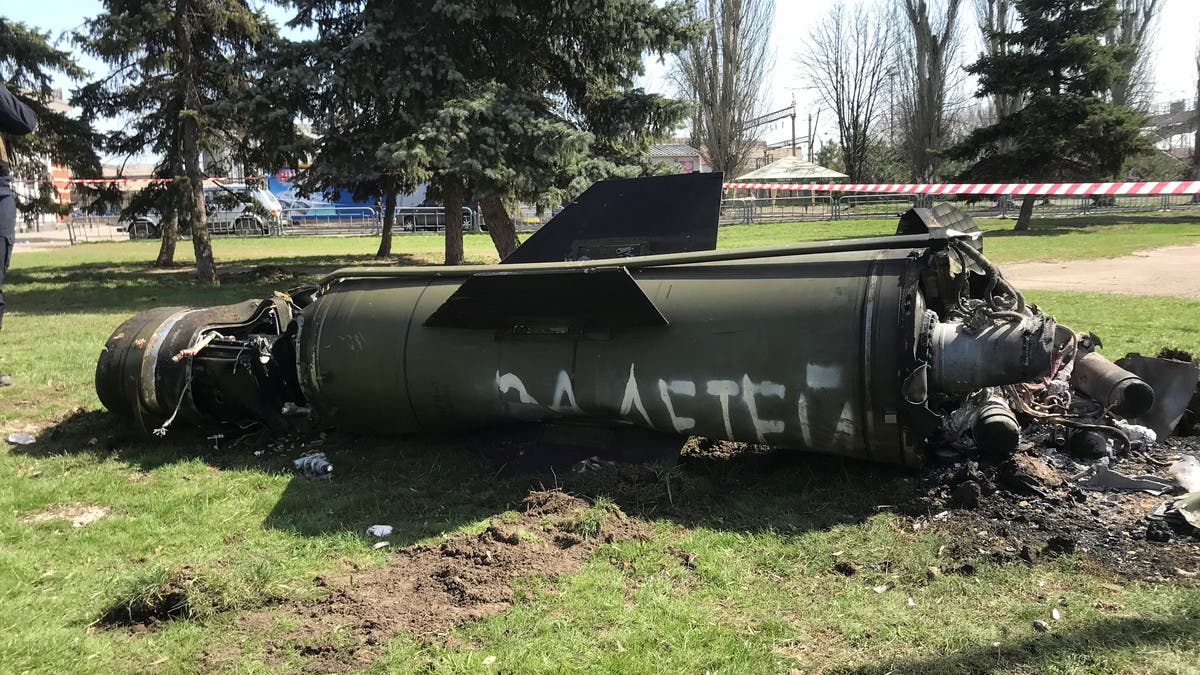Ukrainian President Volodymyr Zelenskyy said he wants a tough global response to Russia after its forces fired a missile at a crowded train station, killing at least 52 people.
Zelenskyy’s voice rose in anger during his nightly address late Friday, when he said the strike on the Kramatorsk train station, where 4,000 people were trying to flee a looming Russian offensive in the east, amounted to another war crime.
For the latest headlines, follow our Google News channel online or via the app.
Russia denied it was responsible for the strike. Among those killed were five children, and dozens of people were severely injured.
Photos taken after the attack showed corpses covered with tarpaulins, and the remnants of a rocket painted with the words “For the children” in Russian. The Russian phrasing seemed to suggest the missile was sent to avenge the loss or subjugation of children, although its exact meaning remained unclear.
The strike seemed to shock world leaders.
“There are almost no words for it,” European Union Commission President Ursula von der Leyen told reporters during a visit to Ukraine. “The cynical behavior (by Russia) has almost no benchmark anymore.”
The attack came as workers elsewhere in the country unearthed bodies from a mass grave in Bucha, a town near Kyiv, where graphic evidence of dozens of killings emerged following the withdrawal of Russian forces.
“Like the massacres in Bucha, like many other Russian war crimes, the missile attack on Kramatorsk should be one of the charges at the tribunal that must be held,” Zelenskyy said.
He said efforts would be taken “to establish every minute of who did what, who gave what orders, where the missile came from, who transported it, who gave the command and how this strike was agreed to.”
After failing to take Kyiv in the face of stiff resistance, Russian forces have now set their sights on the eastern Donbas region, the mostly Russian-speaking, industrial area where Moscow-backed rebels have been fighting Ukrainian forces for eight years and control some places.
Although the train station is in Ukrainian government-controlled territory in the Donbas, Russia accused Ukraine of carrying out the attack. So did the region’s Moscow-backed separatists, who work closely with Russian troops.
Western experts, however, dismissed Kremlin spokesperson Dmitry Peskov’s assertion that Russian forces “do not use” that type of missile. A Western official, speaking on condition of anonymity to discuss intelligence, said Russia’s forces have used the missile — and that given the strike’s location and impact, it was likely Russia’s.
Justin Bronk, a research fellow at the Royal United Services Institute in London, added that only Russia would have reason to target railway infrastructure in the Donbas, as it is critical for the Ukrainian military’s efforts to reinforce its units.
Bronk pointed to other occasions when Russian authorities have tried to deflect blame by claiming their forces no longer use an older weapon “to kind of muddy the waters and try and create doubt.” He suggested Russia specifically chose the missile type because Ukraine also possesses them.
British Defense Minister Ben Wallace denounced the attack as a war crime, and UN Secretary-General Antonio Guterres called it “completely unacceptable.”
Ukrainian authorities and Western officials have repeatedly accused Russian forces of atrocities in the war that began with a February 24 invasion.
Read more:
Russia revokes registration of Amnesty and Human Rights Watch
UK sending Ukraine ‘high-grade’ weaponry after station attack
Ukrainian forensic investigators start exhuming bodies from Bucha mass grave

 World3 years ago
World3 years ago
 World3 years ago
World3 years ago
 Business1 year ago
Business1 year ago
 Entertainment8 years ago
Entertainment8 years ago
 World8 years ago
World8 years ago
 Entertainment8 years ago
Entertainment8 years ago






